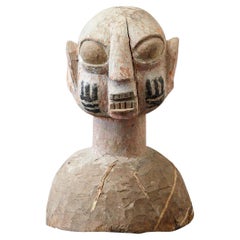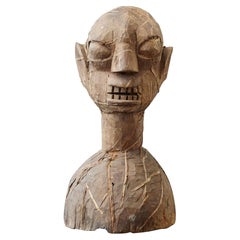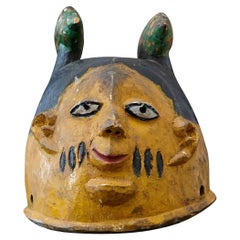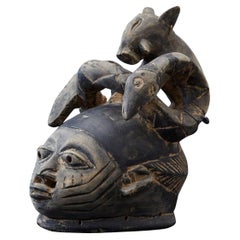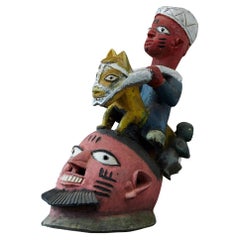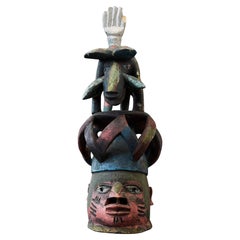Aari Ona Arte Folk Art
to
44
44
1
11
33
11
22
2
3
2
3
25
17
13
4
2
44
41
26
6
3
44
44
44
23
2
1
Wooden Head of a Wife of an Ooni of Ile-Ife, Yoruba People, Nigeria, circa 1930s
By Yoruba People
Located in Aramits, Nouvelle-Aquitaine
Wooden head of a wife of an Ooni of Ile-Ife, Yoruba People, Nigeria, circa 1930s.
The Ooni is the traditional ruler of Ile-Ife. The Nigerian town is seen as the cradle of the Yoruba people.
The number is the inventory number from Lehigh University.
Exhibited: The Lehigh University - Art Galleries permanent collection.
Provenance: The collection of Dr and Mrs John E. Swanson.
Dr John Swanson and his wife Marian lived from 1966-1981 in Lagos, Nigeria where Dr Swanson was the Advisor to the National Universities Commission and later on the Chief Planning Officer of the University of Ibadan, Nigeria.
During their time in Africa the Swansons started to collect African art. In 1973 a part of their collection, circa 120 pieces went on loan to The Pennsylvania State University Museum of Art, where the remained until 1978.
In 1981 Dr Swanson passed away and his wife Marian never returned to Africa.
In 1982 Mrs Swanson lent 130 pieces to the Lehigh University Art Gallery where they remained until 1987. A few pieces were also lent to Lafayette College...
Category
Early 20th Century Nigerian Tribal Tribal Art
Materials
Wood
Wooden Head of an Ooni of Ile-Ife, Yoruba People, Nigeria, circa 1930s
By Yoruba People
Located in Aramits, Nouvelle-Aquitaine
Wooden head of an Ooni of Ile-Ife, Yoruba People, Nigeria, circa 1930s.
The Ooni is the traditional ruler of Ile-Ife. The Nigerian town is seen as the cradle of the Yoruba people.
The number is the inventory number from Lehigh University.
Exhibited: The Lehigh University - Art Galleries permanent collection.
Provenance: The collection of Dr and Mrs John E. Swanson.
Dr John Swanson and his wife Marian lived from 1966 - 1981 in Lagos, Nigeria where Dr Swanson was the Advisor to the National Universities Commission and later on the Chief Planning Officer of the University of Ibadan, Nigeria.
During their time in Africa the Swansons started to collect African art. In 1973 a part of their collection, circa 120 pieces went on loan to The Pennsylvania State University Museum of Art, where the remained until 1978.
In 1981 Dr Swanson passed away and his wife Marian never returned to Africa.
In 1982 Mrs Swanson lent 130 pieces to the Lehigh University Art Gallery where they remained until 1987. A few pieces were also lent to Lafayette College...
Category
Early 20th Century Nigerian Tribal Tribal Art
Materials
Wood
Polychrome Wood Gelede Headdress, Yoruba People, Nigeria, circa 1940s
By Yoruba People
Located in Aramits, Nouvelle-Aquitaine
Gelede festivals honour the creative and dangerous power of women elders, female ancestors and goddesses known as "our mothers". The Gelede headdress often consists of two parts, a lower mask and an upper elaborate superstructure. The lower mask depicts a woman's face, it's composure expressing the qualities of calmness and patience.
The numbers are the inventory numbers from Penn State University and Lehigh University.
Exhibited: The Pennsylvania State University - Museum of Art permanent collection; The Lehigh University - Art Galleries permanent collection.
Provenance: The collection of Dr and Mrs John E. Swanson.
Dr John Swanson and his wife Marian lived from 1966 - 1981 in Lagos, Nigeria where Dr Swanson was the Advisor to the National Universities Commission and later on the Chief Planning Officer of the University of Ibadan, Nigeria.
During their time in Africa the Swansons started to collect African art. In 1973 a part of their collection, circa 120 pieces went on loan to The Pennsylvania State University Museum of Art, where the remained until 1978.
In 1981 Dr Swanson passed away and his wife Marian never returned to Africa.
In 1982 Mrs Swanson lent 130 pieces to the Lehigh University Art Gallery where they remained until 1987. A few pieces were also lent to Lafayette College...
Category
Mid-20th Century Nigerian Tribal Tribal Art
Materials
Wood
Gelede Headdress, Yoruba People, Nigeria, circa 1920s
By Yoruba People
Located in Aramits, Nouvelle-Aquitaine
Gelede festivals honor the creative and dangerous power of women elders, female ancestors and goddesses known as "our mothers". The Gelede headdress often consists of two parts, a lo...
Category
Early 20th Century Nigerian Tribal Tribal Art
Materials
Wood
Gelede Headdress, Yoruba People, Nigeria, circa 1950s
By Yoruba People
Located in Aramits, Nouvelle-Aquitaine
Gelede festivals honor the creative and dangerous power of women elders, female ancestors and goddesses known as "our mothers". The Gelede headdress often consists of two parts, a lo...
Category
Mid-20th Century Nigerian Tribal Tribal Art
Materials
Wood
Gelede Headdress, Yoruba People, Nigeria, circa 1950s
By Yoruba People
Located in Aramits, Nouvelle-Aquitaine
Gelede festivals honor the creative and dangerous power of women elders, female ancestors and goddesses known as "our mothers". The Gelede headdress often consists of two parts, a lo...
Category
Mid-20th Century Nigerian Tribal Tribal Art
Materials
Wood
Tall Carved Wooden Oracle or Divination Tapper "Iroke Ifa", Yoruba People, 1930s
By Yoruba People
Located in Aramits, Nouvelle-Aquitaine
Tall hand-carved wooden oracle or divination tapper "Iroke Ifa" statue, showing a kneeling woman holding her breasts. Yoruba, Nigeria, circa 1930s.
Yoruba belief specifies that each ...
Category
Vintage 1930s Nigerian Tribal Tribal Art
Materials
Wood
Woman Carrying Baby in a Papoose, Kola Nut Holder from Abeokuta, Nigeria, 1950s
Located in Aramits, Nouvelle-Aquitaine
Carved wooden kola nut holder, depicting a woman carrying a baby in a papoose and holding a bowl overhead, from Abeokuta, Nigeria, 1950s
There is a small...
Category
Early 20th Century Nigerian Tribal Tribal Art
Materials
Wood
Woman Sacrificing Holding Offering Bowl, Yoruba People, Nigeria, 1940s
By Yoruba People
Located in Aramits, Nouvelle-Aquitaine
Carved wooden sculpture depicting a woman sacrificing holding an offering bowl, Yoruba People,
Nigeria, 1940s
There is a small old chip on the top, please refer to the photos.
The numbers are the inventory numbers from Pennsylvania State University and Lehigh University.
Exhibited: The Pennsylvania State University - Museum of Art permanent collection;
The Lehigh University - Art Galleries permanent collection and the
Provenance: The collection of Dr and Mrs. John E. Swanson.
Dr John Swanson and his wife Marian lived from 1966 - 1981 in Lagos, Nigeria where Dr Swanson was the Advisor to the National Universities Commission and later on the Chief Planning Officer of the University Of Ibadan, Nigeria.
During their time in Africa the Swansons started to collect African art. In 1973 a part of their collection, circa 120 pieces went on loan to The Pennsylvania State University Museum of Art, where they remained until 1978.
In 1981 Dr Swanson passed away and his wife Marian never returned to Africa.
In 1982 Mrs. Swanson lent 130 pieces to the Lehigh University Art Gallery where they remained until 1987. A few pieces were also lent to Lafayette College...
Category
Mid-20th Century Nigerian Tribal Tribal Art
Materials
Wood
Kuduo - Bronze Gold Dust Vessel, Asante People, Ghana, 1940s
By Akan Ashanti
Located in Aramits, Nouvelle-Aquitaine
A beautiful bronze vessel, lidded pot on three legs, made by the Asante People, Ghana. Nicely cast lid with 4 reptiles and a bird. Several faces are depicted on the side of the vesse...
Category
Vintage 1940s Ghanaian Tribal Tribal Art
Materials
Bronze
Bronze Statue of a Juju Man, Benin, 1930s
By People from Benin
Located in Aramits, Nouvelle-Aquitaine
Statues of Juju Man or shamans were used for ceremonies connected with religious beliefs and magical practices. The general understanding of their meaning as including a supernatural...
Category
Vintage 1930s Beninese Tribal Tribal Art
Materials
Bronze
Cast Bronze Relief Plaque from Benin, 1950s
By People from Benin
Located in Aramits, Nouvelle-Aquitaine
Intriguing cast bronze relief plaque from Benin, showing three guardians.
The plaque was modeled after ancient Benin bronzes but was made in the 20th century. The plaque is cast in b...
Category
Vintage 1940s Beninese Tribal Tribal Art
Materials
Bronze
Bronze Head of an Oba, Yoruba People, 1950s
By Yoruba People
Located in Aramits, Nouvelle-Aquitaine
A Benin bronze of an Oba. Oba means ruler in the Yoruba language.
Wearing a lattice-pattern cap with strands of beads suspended around the head.
The neck is bound with a lattice-patt...
Category
Vintage 1950s Beninese Tribal Tribal Art
Materials
Bronze
Edan Staffs for Ogboni Society, Yoruba People People, Nigeria, 20th century
By Yoruba People
Located in Aramits, Nouvelle-Aquitaine
Pair of Bronze & Iron Ogboni Society staffs from the Yoruba People, Nigeria, early 20th century.
Among the Yoruba, in southwestern Nigeria, there was and still is the Ogboni secret s...
Category
Early 20th Century Nigerian Tribal Tribal Art
Materials
Bronze, Iron
Nomoli - Carved Stone Figurine, Kissi People, Sierra Leone, 19th Century
Located in Aramits, Nouvelle-Aquitaine
A Nomoli is a carved stone figurine native to Sierra Leone and Liberia. They are usually made of soapstone, limestone, or granite.
The carving depicts a woman in a dress and choker,...
Category
Antique 19th Century Sierra Leonean Tribal Tribal Art
Materials
Stone, Soapstone
Nomoli - Carved Stone Figurine, Kissi People, Sierra Leone, 19th Century
Located in Aramits, Nouvelle-Aquitaine
A Nomoli is a carved stone figurine native to Sierra Leone and Liberia. They are usually made of soapstone, limestone, or granite.
The carving depicts a man holding his belly with a...
Category
Antique 19th Century Sierra Leonean Tribal Tribal Art
Materials
Stone, Soapstone
Standing Carved Wooden Figural Spoon, Yoruba People, 1960s
By Yoruba People
Located in Aramits, Nouvelle-Aquitaine
Large carved wooden spoon in the shape of a standing female figure, with a round bowl over her head, Yoruba People, circa 1960s.
The numbers are the inventory numbers from Penn Stat...
Category
Vintage 1960s Nigerian Tribal Tribal Art
Materials
Wood
Carved Wooden Statue of a Ju Ju Man, Egba People, Abeokuta, 1940s
Located in Aramits, Nouvelle-Aquitaine
Tall hand-carved wooden statue of a Ju Ju Man crafted by the Egba People in Abeokuta, Ogun State (part of Nigeria), circa 1940s.
The pupils are made from nails, which intensifies the...
Category
Vintage 1940s African Tribal Tribal Art
Materials
Wood
Ere Ibeji Female Commemorative Figure, Yoruba People, Nigeria, early 20th C
By Yoruba People
Located in Aramits, Nouvelle-Aquitaine
Yoruba people have one of the highest incidents of twin births in the world. As a result, twin children are regarded as extraordinary, divine beings protected by Sango, the deity of ...
Category
Early 20th Century Nigerian Tribal Tribal Art
Materials
Wood
Carved Wooden Statue of a Dancer "Queen Dancer", Egba People, Abeokuta, 1950s
Located in Aramits, Nouvelle-Aquitaine
A tall hand-carved statue of a dancer "Queen Dancer" crafted by the Egba People, Abeokuta, Ogun State, Nigeria, circa 1950s.
The statue is hand-carved in a rather rough way, not very...
Category
Vintage 1950s Nigerian Tribal Tribal Art
Materials
Wood
Ere Ibeji Male Commemorative Figure, Yoruba People, Nigeria, early 20th C
By Yoruba People
Located in Aramits, Nouvelle-Aquitaine
Yoruba people have one of the highest incidents of twin births in the world. As a result, twin children are regarded as extraordinary, divine beings protected by Sango, the deity of ...
Category
Early 20th Century Nigerian Tribal Tribal Art
Materials
Wood
Ere Ibeji Female Commemorative Figure, Egba, Yoruba People, Nigeria, 20th C
By Yoruba People
Located in Aramits, Nouvelle-Aquitaine
Yoruba people have one of the highest incidents of twin births in the world. As a result, twin children are regarded as extraordinary, divine beings protected by Sango, the deity of ...
Category
Mid-20th Century Nigerian Tribal Tribal Art
Materials
Wood
Ere Ibeji Pair of Commemorative Figures, Oshogbo, Yoruba People, Nigeria, 20th C
By Yoruba People
Located in Aramits, Nouvelle-Aquitaine
Yoruba people have one of the highest incidents of twin births in the world. As a result, twin children are regarded as extraordinary, divine beings protected by Sango, the deity of ...
Category
Vintage 1960s Nigerian Tribal Tribal Art
Materials
Wood
Ere Ibeji Pair of Commemorative Figures, Oyo, Yoruba People Nigeria, late 19th C
By Yoruba People
Located in Aramits, Nouvelle-Aquitaine
Yoruba people have one of the highest incidents of twin births in the world. As a result, twin children are regarded as extraordinary, divine beings protected by Sango, the deity of ...
Category
Antique 1890s Nigerian Tribal Tribal Art
Materials
Wood
Ere Ibeji Pair of Commemorative Figures, Ife, Yoruba People Nigeria early 20th C
By Yoruba People
Located in Aramits, Nouvelle-Aquitaine
Yoruba people have one of the highest incidents of twin births in the world. As a result, twin children are regarded as extraordinary, divine beings protected by Sango, the deity of ...
Category
Early 20th Century Nigerian Tribal Tribal Art
Materials
Wood
Ere Ibeji Pair of Commemorative Figures, Abeokuta, Yoruba People Nigeria, 20th C
By Yoruba People
Located in Aramits, Nouvelle-Aquitaine
Yoruba people have one of the highest incidents of twin births in the world. As a result, twin children are regarded as extraordinary, divine beings protected by Sango, the deity of ...
Category
Mid-20th Century Nigerian Tribal Tribal Art
Materials
Wood
Ere Ibeji Pair of Commemorative Figures, Egba, Yoruba People, Nigeria, 20th C
By Yoruba People
Located in Aramits, Nouvelle-Aquitaine
Yoruba people have one of the highest incidents of twin births in the world. As a result, twin children are regarded as extraordinary, divine beings protected by Sango, the deity of ...
Category
Mid-20th Century Nigerian Tribal Tribal Art
Materials
Wood
Ere Ibeji Pair of Commemorative Figures, Ogbomosho, Yoruba People Nigeria 20th C
By Yoruba People
Located in Aramits, Nouvelle-Aquitaine
Yoruba people have one of the highest incidents of twin births in the world. As a result, twin children are regarded as extraordinary, divine beings protected by Sango, the deity of ...
Category
Mid-20th Century Nigerian Tribal Tribal Art
Materials
Wood
Ere Ibeji Pair of Commemorative Figures, Abeokuta, Yoruba People Nigeria, 20th C
By Yoruba People
Located in Aramits, Nouvelle-Aquitaine
Yoruba people have one of the highest incidents of twin births in the world. As a result, twin children are regarded as extraordinary, divine beings protected by Sango, the deity of ...
Category
Mid-20th Century Nigerian Tribal Tribal Art
Materials
Wood
Ere Ibeji Pair of Commemorative Figures, Abeokuta, Yoruba People Nigeria, 20th C
By Yoruba People
Located in Aramits, Nouvelle-Aquitaine
Yoruba people have one of the highest incidents of twin births in the world. As a result, twin children are regarded as extraordinary, divine beings protected by Sango, the deity of ...
Category
Mid-20th Century Nigerian Tribal Tribal Art
Materials
Wood
Bronze Currency Bangle/Manilla, Oromo People, Burkina Faso, Ethiopia, 19th C.
Located in Aramits, Nouvelle-Aquitaine
19th-century bronze currency bangle / Manilla with a fixed opening. Minimalist, simple design work with engraved geometrical circles and lines.
This type of bracelet was used and wor...
Category
Antique Mid-19th Century Ethiopian Tribal Tribal Art
Materials
Bronze
Bronze Currency Bracelet/Manilla, Dogon People, Burkina Faso, 19th c. - No 5
Located in Aramits, Nouvelle-Aquitaine
19th-century bronze currency bracelet / Manilla in horseshoe form with fixed opening. Intricate graphical swirled rope work design and tips are shaped with large flat ends with geome...
Category
Antique Mid-19th Century Burkinabe Tribal Tribal Art
Materials
Bronze
Bronze Currency Bracelet/Manilla, Dogon People, Burkina Faso, 19th c. - No 4
Located in Aramits, Nouvelle-Aquitaine
19th-century bronze currency bracelet / Manilla in horseshoe form with fixed opening. Intricate graphical swirl design and tips are shaped with large flat ends with cross pattern des...
Category
Antique Mid-19th Century Burkinabe Tribal Tribal Art
Materials
Bronze
Bronze Currency Bracelet/Manilla, Dogon People, Burkina Faso, 19th c. - No 3
Located in Aramits, Nouvelle-Aquitaine
19th-century bronze currency bracelet / Manilla in horseshoe form with fixed opening. Intricate graphical design with a lattice pattern. This type of bracelet was worn or used by the...
Category
Antique Mid-19th Century Burkinabe Tribal Tribal Art
Materials
Bronze
Bronze Currency Bracelet/Manilla, Dogon People, Burkina Faso, 19th c. - No 2
Located in Aramits, Nouvelle-Aquitaine
19th-century bronze currency bracelet / Manilla in horseshoe form with fixed opening. Intricate graphical design with lines and accent points on the top and at both tips. This type o...
Category
Antique Mid-19th Century Burkinabe Tribal Tribal Art
Materials
Brass
Opon Igede Ifa - Divination Bowl, Yoruba People, Nigeria, Early 20th Century
By Yoruba People
Located in Aramits, Nouvelle-Aquitaine
Hand-carved Opon Igede Ifa or divination bowl, Yoruba People, Nigeria, early 20th Century.
A Babalawo ("diviner") of the West African Yoruba people uses an Opon Igede Ifa to store th...
Category
Early 20th Century Nigerian Tribal Tribal Art
Materials
Wood
Bronze Currency Bracelet/Manilla, Beri People, Sudan, 19th Century - No 2
Located in Aramits, Nouvelle-Aquitaine
Early to mid-19th-century bronze currency bracelet / Manilla in circle form. Intricate graphical geometrical. This type of bracelet was worn/used by the Zaghawa People also called Bé...
Category
Antique Mid-19th Century Sudanese Tribal Tribal Art
Materials
Bronze
Bronze Currency Bracelet/Manilla, Beri People, Sudan, 19th Century - No 1
Located in Aramits, Nouvelle-Aquitaine
Early to mid-19th-century bronze currency bracelet / Manilla in circle form. Intricate graphical geometrical. This type of bracelet was worn/used by the Zaghawa People also called Bé...
Category
Antique Mid-19th Century Sudanese Tribal Tribal Art
Materials
Bronze
Bronze Currency Bracelet/Manilla, Dogon People, Burkina Faso, 19th Century
Located in Aramits, Nouvelle-Aquitaine
19th-century bronze currency bracelet / Manilla in horseshoe form with fixed opening. Intricate graphical swirl design and tips are shaped with large flat ends with 5 beads on each s...
Category
Antique Mid-19th Century Burkinabe Tribal Tribal Art
Materials
Brass
Solid Brass Currency Bracelet/Manilla, Gurma People, Burkina Faso, Early 20th C
Located in Aramits, Nouvelle-Aquitaine
Early 20th-century brass currency bracelet / Manilla in horseshoe form with fixed opening. Hand-stamped and shaped graphical motives and the ti...
Category
Early 20th Century Burkinabe Tribal Tribal Art
Materials
Brass
Solid Brass/Nickel Alloy Cuff Bracelet, Nupe People, Nigeria, 19th/20th Century
By Nupe
Located in Aramits, Nouvelle-Aquitaine
Late 19th or early 20th-century brass or copper alloy with higher nickel content. Bracelet in horseshoe form with fixed opening. Pierced design with rectangular shapes and carved swi...
Category
Early 20th Century Nigerian Tribal Tribal Art
Materials
Brass, Nickel
Ashanti Bronze Figurine, Asante People, Ghana, 1950s
By Akan Ashanti
Located in Aramits, Nouvelle-Aquitaine
Akan Ashanti cast bronze figurine. The Ashanti or Asante People from Ghana have a rich tradition of crafting bronze pieces to commemorate important figures from their culture or peop...
Category
Mid-20th Century Ghanaian Tribal Tribal Art
Materials
Bronze
Traditional Hardwood Crocodile Carving, Nigeria, cira 1970s
Located in Aramits, Nouvelle-Aquitaine
Decorative Folk Art hand-carved hardwood crocodile, with lots of details in the carving. Nigeria, circa 1970s.
Category
Mid-20th Century Nigerian Folk Art Sculptures and Carvings
Materials
Hardwood
Bronze Dan Bell, Cote d'Ivoire, 1960s
Located in Aramits, Nouvelle-Aquitaine
Bronze Dan (also called Yakuba) bell, Cote d'Ivoire, circa 1960s.
This Dan bell is made from the lost-wax process. It has a looped handle and stylized designs on the bell and around ...
Category
Vintage 1960s Ivorian Tribal Tribal Art
Materials
Bronze
